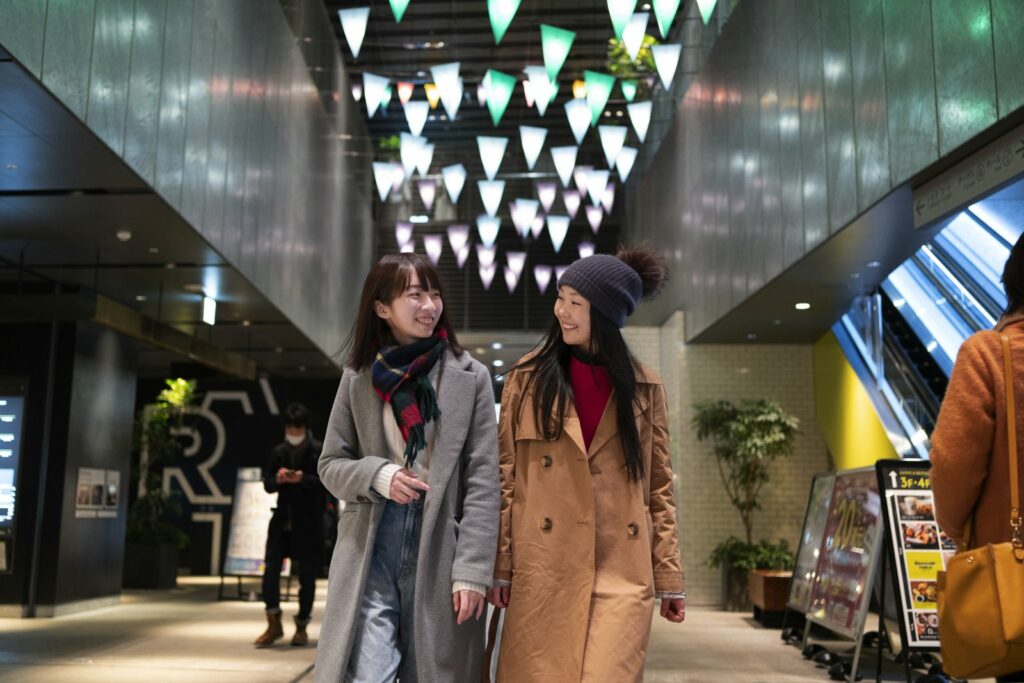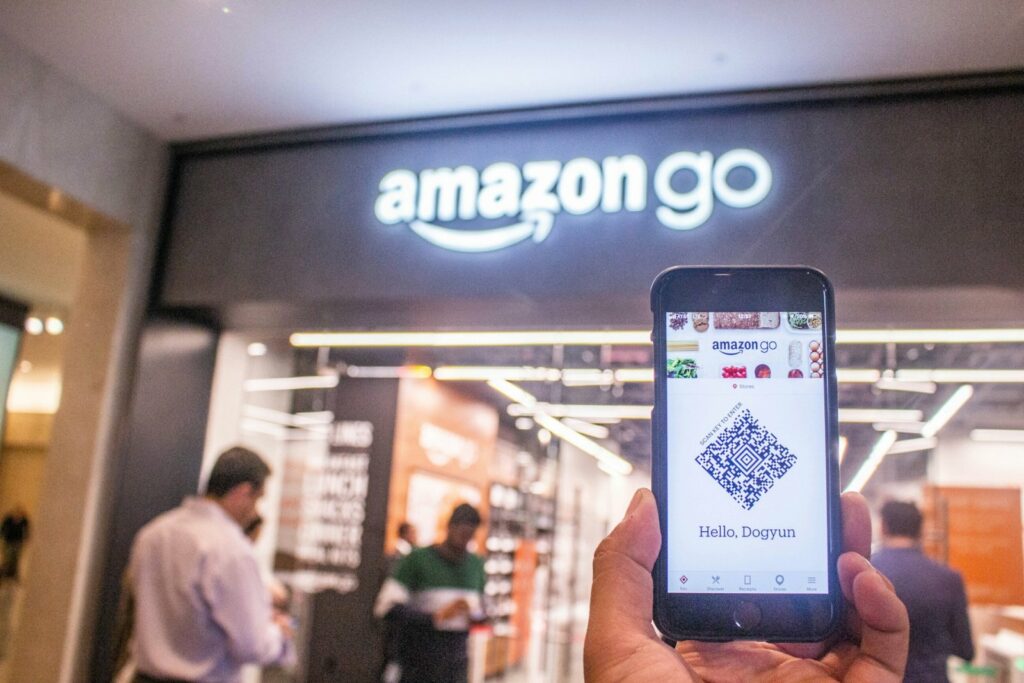The future of retail is characterized by a seamless integration of online and offline experiences, driven by advancements in AI, augmented reality (AR), and data analytics. Retailers will increasingly leverage AI to personalize shopping experiences, optimize supply chains, and enhance customer service through chatbots and virtual assistants.
AR will enable customers to try products virtually, bridging the gap between physical and digital shopping. Omnichannel strategies will also become more prevalent, ensuring a consistent and convenient experience across all touchpoints. The future of retail will also focus heavily on sustainability and ethical practices, as consumers demand more transparency and responsibility from brands.
The future of retail for brick-and-mortar stores will no longer be primarily designed to sell products, as customers are increasingly looking for experiences as much as shopping. Stores need a fundamental rethink to completely transform the shopping experience and change the market in the same way the internet did. This experiential shift is a key aspect of the future of retail.
Retailers plan to continue leveraging technology, automation, and AI to find operational efficiencies and meet customer demands. To explore specific examples of how technology is changing retail, see our in-depth breakdown here. “The Future of Retail Report: 2024 Edition” states that consumers now expect retailers to use technology, with 67% of retail shoppers preferring automation over talking to live staff for tasks that make their shopping experience more efficient. This reliance on technology is a significant trend in the future of retail.
What are the Most Popular Trends in the Future of Retail?
The future of retail is driven by omnichannel integration, AI, AR, and sustainability. Consumers will enjoy seamless online and offline experiences, personalized shopping, and smart stores. Direct-to-consumer models and efficient delivery options will become standard, while ethical and sustainable practices will be crucial. These trends make the future of retail more customer-centric, technology-driven, and sustainable.
China is leading the future of retail with innovations like livestream shopping, where influencers create engaging real-time sales, and the integration of omnichannel retail, seamlessly blending online and offline experiences. The widespread adoption of mobile payments, smart stores utilizing AI and IoT, and social commerce on platforms like WeChat are transforming the future of retail in China.
Popular Trends in the Future of Retail #1: High Tech
Innovations in AI, AR, and data analytics are transforming how retailers operate and engage with customers, marking a significant shift in the future of retail.
AI continues to influence the retail conversation. Between October 15, 2023, and April 15, 2024, 262.1k mentions of AI in retail-related conversations were tracked, an increase of 27% compared to the previous six months.
For a closer look at the future of AI in retail and key insights from China’s market, explore our 2025 report.

Consumers seek more convenience when shopping, such as personalized recommendations and easy customer support, and they welcome the idea of AI. Yet, in related conversations online, many people were quick to point out that AI-powered automation is not always helpful, suggesting there’s a long way to go before they fully embrace it in the future of retail.
For example, Alibaba’s use of AI and XR in their “New Retail” strategy exemplifies the future of retail. In 2023, Alibaba’s Freshippo (Hema) stores saw a 30% increase in sales through AI-powered personalized recommendations and seamless online-to-offline shopping experiences.
Alibaba also employed XR technology to create virtual fitting rooms, which led to a 25% reduction in return rates by allowing customers to visualize products in real-time before making a purchase. These innovations are paving the way for the future of retail. To understand the core systems behind this transformation, explore what retail technology means today.
Popular Trends in the Future of Retail #2: Customer Experience
Enhancing the customer journey through personalized services and seamless interactions is becoming paramount in the future of retail.
Customers are now active and want to share their experiences and feel their needs are being heard. That’s why there’s an increase in relevance for consumer reviews, and businesses focus more on people-centric experiences. Emily Xu, director of marketing for Mitchell Gold + Bob Williams, says that “the store will become more of a hub of a community in the future.”

In the next few years, traditional outlets can become places where retailers and consumers come together to design, discuss, and co-create products. Known as “in-store experience,” these collaborations invite retailers and consumers to push sustainability and target values-based experiences.
This concept, for example, presents the opportunity to bring together consumers, employees, and local experts to collaborate on circular projects that repair or recycle previously purchased items, further defining the future of retail.
Popular Trends in the Future of Retail #3: Omnichannel Shopping
Providing a unified shopping experience across digital and physical channels is now essential in the future of retail.
Since consumers want to be able to research online what they need and, afterward, buy in-store, or the other way around, this seamless integration is crucial. That’s why in recent years, 60% of consumers say they conduct online research before purchasing, and 80% of the time, a consumer returns a product in-store and spends the refund with the same retailer.
In the future of retail, in-store experiences need to elevate customers’ experiences by providing technological advancements such as checkout-free and touch-free shopping. These options can give a sense of safety to customers and, at the same time, accelerate the reduction of physical interaction, a consequence of the pandemic that still matters.
A prime example of omnichannel shopping in the future of retail is JD’s “Boundaryless Retail” initiative. In 2023, JD integrated online and offline channels, creating a seamless shopping experience for customers.
This strategy included 500 smart stores where customers could use mobile apps to scan items for information, receive personalized recommendations, and make instant purchases. The initiative led to a 35% increase in customer engagement and a 20% boost in sales, demonstrating the effectiveness of a cohesive omnichannel approach in the future of retail.
Popular Trends in the Future of Retail #3: Gen Z, the Shopping Powerhouse
Retailers are adapting to the preferences and behaviors of Gen Z, who are driving new trends and demands in the market, shaping the future of retail.
Gen Z makes up nearly 30% of the total global population, and it’s predicted that they’ll constitute about 27% of the workforce by 2025. They’re also the first generation fully raised in a digital world, spending more time online than any other group. Their spending power is growing, making them a critical demographic in the future of retail.
Retailers need to appeal to Gen Z’s specific habits and preferences, such as how they seek out input from trusted sources online. Gen Z and millennial consumers are twice as likely as older shoppers to state that watching an online video was their most influential shopping activity. This trend highlights the importance of digital engagement in the future of retail.
Why Hire a Keynote Speaker to Talk About the Future of Retail?
Keynote speakers captivate audiences with visionary insights into the future of retail, sparking excitement and motivation for embracing upcoming trends. Their engaging delivery and compelling stories leave listeners inspired to drive innovation within their own organizations, shaping the future of retail.
The Future of Retail Keynote Speakers Engage and Inspire
The future of retail keynote speakers engage and inspire by presenting cutting-edge innovations like AI and AR, sharing compelling transformation stories, and highlighting tangible benefits with concrete data. They use dynamic visuals and live demos, provide actionable takeaways, and encourage forward-thinking mindsets. Interactive Q&A sessions ensure content relevance and personalization, making the insights highly impactful for the future of retail.

The Future of Retail Keynote Speakers Provide Expert Analysis and Insights
With extensive knowledge of retail evolution and emerging technologies, keynote speakers offer detailed analysis and expert insights into the future of retail. Their informed perspectives help audiences navigate the complexities of digital transformation and stay ahead of market trends.
The future of retail keynote speakers provide expert analysis by leveraging their industry knowledge to dissect emerging trends like AI-driven personalization, augmented reality, and omnichannel strategies. They use data-driven insights to explain how these innovations impact consumer behavior, supply chains, and competitive positioning, helping audiences understand and implement these changes strategically.

For example, a speaker might analyze Amazon Go’s cashierless stores, highlighting how advanced sensors and computer vision technology enhance customer convenience and reduce labor costs. By examining operational data and consumer feedback, they provide insights into the ROI, customer satisfaction, and scalability of this model, offering a practical blueprint for other retailers in the future of retail.
The Future of Retail Keynote Speakers Foster a Forward-Thinking Mindset
By presenting pioneering ideas and cutting-edge strategies, keynote speakers foster a forward-thinking mindset among retail professionals. They challenge traditional practices and inspire attendees to envision a future where technology and customer experience are seamlessly integrated into the future of retail.
Future of retail keynote speakers foster a forward-thinking mindset by challenging conventional norms and presenting visionary concepts like AI-driven personalization and sustainable practices. They inspire audiences to anticipate future industry trends and embrace innovation, encouraging proactive adaptation and strategic implementation of new technologies to stay ahead in the evolving retail landscape.
The Future of Retail Keynote Speakers Encourage the Adoption of New Practices
Keynote speakers advocate for adopting innovative retail practices, such as omnichannel strategies and AI-driven personalization. They demonstrate the practical benefits of these approaches, encouraging retailers to embrace change and lead the way in the future of retail.
Future of retail keynote speakers encourage the adoption of new practices by highlighting innovative strategies and trends that are reshaping the industry. They showcase successful case studies and practical examples of businesses implementing concepts like experiential retail, customer-centric approaches, and digital transformation.
By emphasizing the positive outcomes such as enhanced customer engagement, operational efficiency, and competitive edge, speakers inspire audiences to explore and implement these new practices. Their insights and guidance help businesses navigate uncertainties and leverage emerging opportunities in the dynamic future of retail.
Why is it Important to Learn the Future of Retail in the Chinese Market?
China’s leadership in retail innovation underscores the importance of studying this market to grasp the future of retail. According to Statista, revenue in the eCommerce market in China is projected to reach US$1,469 billion in 2024. Key reasons why China is leading the future of retail are as follows:
- Technological Advancements. China is at the forefront of integrating AI, automation, and mobile payments, enhancing customer experiences and streamlining operations. A notable advancement includes the widespread adoption of facial recognition payment systems in stores and restaurants across major Chinese cities, providing fast and secure transactions for consumers.
- Livestream Shopping. In China, livestream shopping involves influencers selling products in real-time, creating a highly engaging and interactive shopping experience. According to the South China Morning Post, China’s massive short video and livestreaming sector has continued to expand this year, with the number of professional hosts surpassing 15 million.
- Omnichannel Integration. Chinese retailers excel in seamlessly blending online and offline shopping, ensuring a consistent and convenient customer journey. For example, major players like Alibaba have implemented “New Retail” strategies, integrating their online platforms with physical stores such as Hema supermarkets. Customers can shop online and pick up or experience products in-store, enhancing convenience and choice.
Ashley Dudarenok: Leading Keynote Speaker on the Future of Retail
China’s retail innovation offers valuable lessons for the global market, showcasing how technological integration can enhance efficiency, reduce costs, and improve customer convenience. By studying China’s approach, businesses worldwide can gain insights into leveraging technology to streamline operations, enhance customer experiences, and stay competitive in an increasingly digital retail landscape.
One example of the future of retail in China is the rapid expansion of unmanned stores. Companies like BingoBox and JD have pioneered cashierless stores where customers can enter, select items, and pay automatically via mobile apps and AI-powered sensors. These stores leverage advanced technologies such as computer vision and RFID to track inventory and customer movements, providing a seamless shopping experience without the need for traditional checkout counters.

Ashley Dudarenok is a highly sought-after keynote speaker on the future of retail, known for her deep expertise and significant influence in the industry. As the founder of digital transformation consultancy ChoZan and China-focused marketing agency Alarice, she has a profound understanding of the digital landscape and New Retail trends.
Ashley’s thought leadership is evident through her authorship of 11 best-selling books, her ‘Digital China’ YouTube show, and contributions to global media outlets like WSJ and Forbes. Recognized as one of the World’s Top 100 Retail Influencers, Ashley collaborates with multinational companies and China’s tech giants, providing cutting-edge insights and strategies for the evolving future of retail.
Ashley Dudarenok should be your choice for a future of retail keynote speaker because of her proven track record and influential industry connections. She has delivered impactful keynotes for major companies like Coca-Cola, Disney, and Shiseido, offering actionable insights on retail innovation.
Her direct relationships with China’s tech giants, such as Alibaba and Hema, provide her with first-hand knowledge of cutting-edge retail strategies. Recognized as one of the World’s Top 100 Retail Influencers, Ashley’s presentations are not only informative but also inspire change and drive results in the future of retail.
Ashley Dudarenok as the Future of Retail Leadership Keynote Speaker
Choosing Ashley Dudarenok as the future of retail leadership keynote speaker ensures unparalleled insights into how technology is revolutionizing the retail industry. Ashley deeply understands and has first-hand experience with integrating advanced technologies like AI, XR, and cloud computing into retail strategies.
Her extensive work includes collaborations with leading Chinese tech giants and retail innovators such as JD, Alibaba, Hema, and more, providing her with unique perspectives on leveraging these technologies to drive retail innovation and enhance customer-centric approaches in the future of retail.
Ashley Dudarenok emerges as a trailblazer in retail leadership, captivating audiences worldwide with her visionary insights into the future of retail. As a keynote speaker, Ashley delves into transformative topics such as digital disruption, AI integration, and the evolution of consumer behavior.
Her expertise not only illuminates current industry trends but also anticipates future shifts, equipping businesses with strategic foresight to navigate the complexities of tomorrow’s retail landscape. With a dynamic speaking style and a knack for making complex concepts accessible, Ashley Dudarenok inspires leaders to embrace innovation, foster customer-centric strategies, and harness the power of technology to drive sustainable growth in the ever-changing future of retail.
The Future of Retail – Frequently Asked Questions (FAQs)
-
What is the future of retail and how is it evolving?
The future of retail is evolving towards a more integrated and personalized experience driven by advancements in technology like AI and omnichannel strategies.
-
What sets the Chinese market apart in the future of retail compared to others?
China’s retail market stands out due to its rapid adoption of innovative technologies like AI, mobile payments, and livestream shopping. This market’s agility in integrating these advancements has transformed consumer experiences, driving significant growth and setting new trends globally in the future of retail.
-
What can others learn from the future of retail in China?
Observing China’s effective integration of omnichannel strategies and innovative marketing techniques such as livestream shopping provides insights into adapting retail models to meet evolving consumer demands and preferences worldwide in the future of retail.
-
What trends are shaping the future of retail?
Key trends in the future of retail include the rise of omnichannel retail, AI and automation integration, personalized customer experiences, and the growth of e-commerce.
-
How is AI impacting the future of retail?
AI is enhancing the future of retail through predictive analytics, personalized recommendations, inventory management optimization, and customer service automation.
-
How leveraging data analytics help the future of retail?
Retailers use data analytics to understand consumer behavior, optimize pricing strategies, personalize marketing campaigns, and forecast demand, improving overall business performance in the future of retail.
-
What are the challenges facing brick-and-mortar retailers in the future of retail?
Retailers use data analytics to understand consumer behavior, optimize pricing strategies, personalize marketing campaigns, and forecast demand, improving overall business performance in the future of retail.
-
What are the emerging technologies transforming the future of retail?
Emerging technologies like augmented reality (AR) for virtual try-ons, the Internet of Things (IoT) for smart inventory management, and blockchain for supply chain transparency are revolutionizing operations in the future of retail.
-
What impact does globalization have on the future of retail?
Globalization expands market reach for retailers, influencing product diversity, international logistics, and cross-border e-commerce, shaping retail strategies worldwide in the future of retail.
-
How is consumer behavior evolving in the future of retail?
Consumers today prioritize convenience, personalized experiences, and ethical considerations, influencing how retailers innovate and adapt their strategies to meet evolving expectations in the future of retail.


